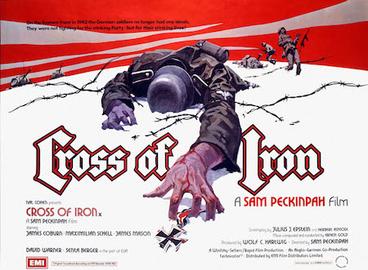The following come from Stephen Prince’s commentary on the DVD. He wrote “Savage Cinema: Sam Peckinpah and the Rise of Ultraviolent Movies”.
The opening song is about a boy who leaves home and is so transformed by his travels that only his mother recognizes him when he returns.
Screenwriters James Hamilton (Korea) and Walter Kelley (WWII – Pacific) were both combat veterans.
In the book, Steiner is 25 years old. Coburn was almost 50.
There is no Russian boy in the novel. His harmonica playing is meant to reawaken innocence in the platoon.
Kiesel is more calm and focused in the novel. He avoids alcohol. In the movie, his alcoholism is Peckinpah’s nod to his own alcohol problems. He directed the movie while mostly drunk (and on cocaine).
When Kiesel makes his toast: “To the heroic horses’ asses”, Brandt mutters: “To the patient flesh” which is a reference to the title of the novel.
Peckinpah was very opposed to the mistreatment of civilians in war. He was a vocal critic of the handling of the My Lai Massacre. However, he does not really make this a theme in the movie. However, the are veiled references to Zoll being not only in the SS, but in an einsatzgruppen. (In the book, Zoll is a jerk, but not in the SS.) This may be confirmed later when Steiner leaves Zoll with the vengeance minded female soldiers and tells them “Now we are even”. That might have been Peckinpah referring to the massacre of civilians by German death squads.
Steiner is clearly a stand-in for Peckinpah. His attitude towards officers reflects Peckinpah’s troubled relations with studio suits and producers.
The book Steiner has a more tense relationship with his men. He is not as fatherly.
The montage of death that is the first battle is a cribbing from Peckinpah’s opus “The Wild Bunch”. In fact, there are a lot of reflections of that film, almost like Peckinpah’s stealing from himself. This montage suddenly shifts into a montage of past and present events as Steiner is wounded.
In the novel, the convalescing Steiner has relations with three nurses and falls in love with one. One of the others frames Steiner for stealing a watch which gets him assigned to a punishment battalion.
When Eva (Senta Berger playing a role similar to hers in “Major Dundee”) tells Steiner he was too violent when the German general visits the hospital, Steiner laughs. This is Peckinpah laughing at critics of his violent movies.
In the book, Steiner does not want to return to the front, but Peckinpah decides to stick with the bros before hos cliché. Or war before hos.
The Iron Cross that Steiner wears is the Iron Cross First Class. Normally, it would require your already receiving the Iron Cross Second Class plus 3-5 additional acts of valor. And yet, Stransky expects to get one for just his supposed actions in the first battle.
When Steiner finds Kruger sitting alone in the bunker after the bombardment, it is an uncut minute and a half. Something very rare in a Peckinpah movie.
The producer promised 15 Soviet tanks, but only got 3. They are Yugoslavian T34/85’s. It is very common for these to be used in war movies to depict the earlier T-34’s.
In the movie, Kiesel tells Brandt that when the war ends, they will prepare for the next one. In the novel, he says they will start life over again.
The Germans actually despised Russian female soldiers and usually dealt with them harshly.
Dietz is not killed by one of the females in the book. In the novel, Zoll is the only one on guard. When he abandons this job to go rape the woman, a German male escapes. That is why Steiner turns him over to the women. Zoll was not castrated.
In the novel, Brandt sends Kiesel home to balance having to transfer Stransky back to France.
The return of the survivors of the platoon through no man’s land was actually the opening scene in the book. In the book, the men killed in the movie scene are actually killed off individually. For instance, Schnurrbart is killed by Treibig on orders from Stransky. For this, Steiner ambushes Stransky but can’t bring himself to kill him because Stransky has his orderly with him. It’s after this that Stransky gets his transfer.
The slow-motion killing of Triebig is similar to the killing of the general in “The Wild Bunch”. Oddly, Peckinpah pulls away before Kruger stabs Triebig showing Peckinpah odd squeamishness for that kind of violence.
The ending was improvised because of money running out. Schell was not supposed to trip on the railroad track.
In the book, Steiner is mortally wounded by a Soviet mortar shell.
In case you did not stick around for the closing credits, Peckinpah uses photos not only from WWII, but other conflicts hard on civilians, including Vietnam. There is an excerpt from a poem by Bertoldt Brecht: “Don’t rejoice in his defeat, you men / For though the world stood up and stopped the bastard, / The bitch that bore him is in hear again.” It is from a play and refers to a gangster who is clearly modelled after Hitler.

No comments:
Post a Comment
Please fell free to comment. I would love to hear what you think and will respond.